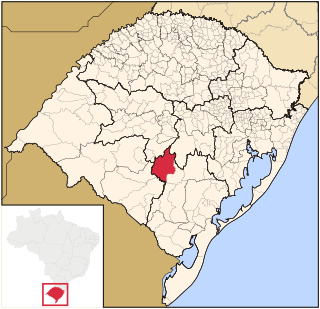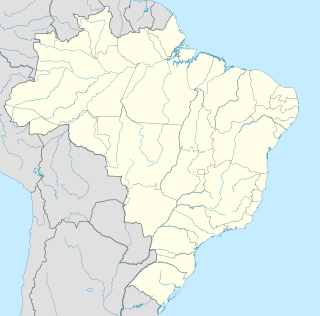Related Research Articles

Rio Grande do Sul is a state in the southern region of Brazil. It is the fifth-most-populous state and the ninth largest by area. Located in the southernmost part of the country, Rio Grande do Sul is bordered clockwise by Santa Catarina to the north and northeast, the Atlantic Ocean to the east, the Uruguayan departments of Rocha, Treinta y Tres, Cerro Largo, Rivera and Artigas to the south and southwest, and the Argentine provinces of Corrientes and Misiones to the west and northwest. The capital and largest city is Porto Alegre. The state has the highest life expectancy in Brazil, and the crime rate is relatively low compared to Brazilian national average.
Talian is a dialect of the Venetian language, spoken primarily in the Serra Gaúcha region in the northeast of the state of Rio Grande do Sul in Brazil. It is also spoken in other parts of Rio Grande do Sul, as well as in parts of Espirito Santo and of Santa Catarina.

The South Region of Brazil is one of the five regions of Brazil. It includes the states of Paraná, Santa Catarina and Rio Grande do Sul and covers 576,409.6 square kilometres (222,553.0 sq mi), being the smallest portion of the country, occupying only about 6.76% of the territory of Brazil. Its whole area is smaller than that of the state of Minas Gerais, in Southeast Brazil, for example. It is a great tourist, economic and cultural pole. It borders Uruguay, Argentina, and Paraguay as well as the Centre-West Region, the Southeast Region and the Atlantic Ocean. The region is considered the safest in Brazil to visit, having a lower crime rate than other regions in the country.

Santa Cruz do Sul is a city in central Rio Grande do Sul, Brazil. The city has an estimate 130,000 inhabitants as of 2019 and sits about 150 km from the capital city of the state, Porto Alegre. The city enjoys a high standard of living and gross income per capita is 2.5 times greater than that of the state of Rio Grande do Sul as a whole.
Pardo is a word used in the Spanish colonies in the Americas to refer to the tri-racial descendants of Europeans, Amerindians, and Africans.

Dyckia is a genus of plants in the family Bromeliaceae, subfamily Pitcairnioideae.

Caçapava do Sul is a Brazilian municipality in the state of Rio Grande do Sul, located on the banks of the Camaquã River. As of 2016, the city has an estimated population of 34,664. It was the 2nd capital of the Piratini Republic from 1839 to 1840.

Arroio do Tigre is a municipality in the state of Rio Grande do Sul, Brazil.

Eldorado do Sul is a municipality in the state of Rio Grande do Sul, Brazil. It is located in the metropolitan area of Porto Alegre, the state's capital and largest city, opposite the capital on the right bank of Guaíba River. Population: 37,366.
Mariano Moro is a municipality in the state of Rio Grande do Sul, Brazil.

Nova Santa Rita is a municipality in the state of Rio Grande do Sul, Brazil.

Planalto is a municipality in the state of Rio Grande do Sul, Brazil, located at 27°19′44″S53°03′31″W, at an altitude of 568 meters above sea level. It has a total area of 237.35 km². Its estimated population in 2004 was of 11,702 inhabitants, and in 2007 it was of 10,589 inhabitants.
Santa Tereza is a municipality in the state of Rio Grande do Sul, Brazil. It was raised to municipality status in 1992, the area being taken out of the municipalities of Bento Gonçalves, Garibaldi and Roca Sales.

São Pedro de Alcântara, Santa Catarina is a municipality in the state of Santa Catarina in the South region of Brazil.

Caçador is a municipality in the state of Santa Catarina in the South region of Brazil.

Banhados do Delta do Jacuí Biological Reserve is a biological reserve in the Jacuí River delta in Rio Grande do Sul, Brazil.

Lorenzi is a bairro in the District of Sede in the municipality of Santa Maria, in the Brazilian state of Rio Grande do Sul. It is located in south Santa Maria.

Santa Margarida do Sul is a municipality in the state of Rio Grande do Sul in the Southern Region of Brazil.

Santa Cecília do Sul is a municipality in the state of Rio Grande do Sul in the Southern Region of Brazil.
References
- ↑ "Lei Nº 4616: Cria o Município de Esmerelda" (PDF) (in Portuguese). Estado do Rio Grande do Sul Assembleia Legislativa. 27 November 1963.
o Rio Piraçupiá (ex-Santa Rita)
- ↑ "Mapa Rodoviário Rio Grande do Sul" (PDF). Brazilian Ministry of Transport. 2002.
| This article related to a river in Rio Grande do Sul is a stub. You can help Wikipedia by expanding it. |